I'm a farmer, a housekeeper - and a volunteer firefighter
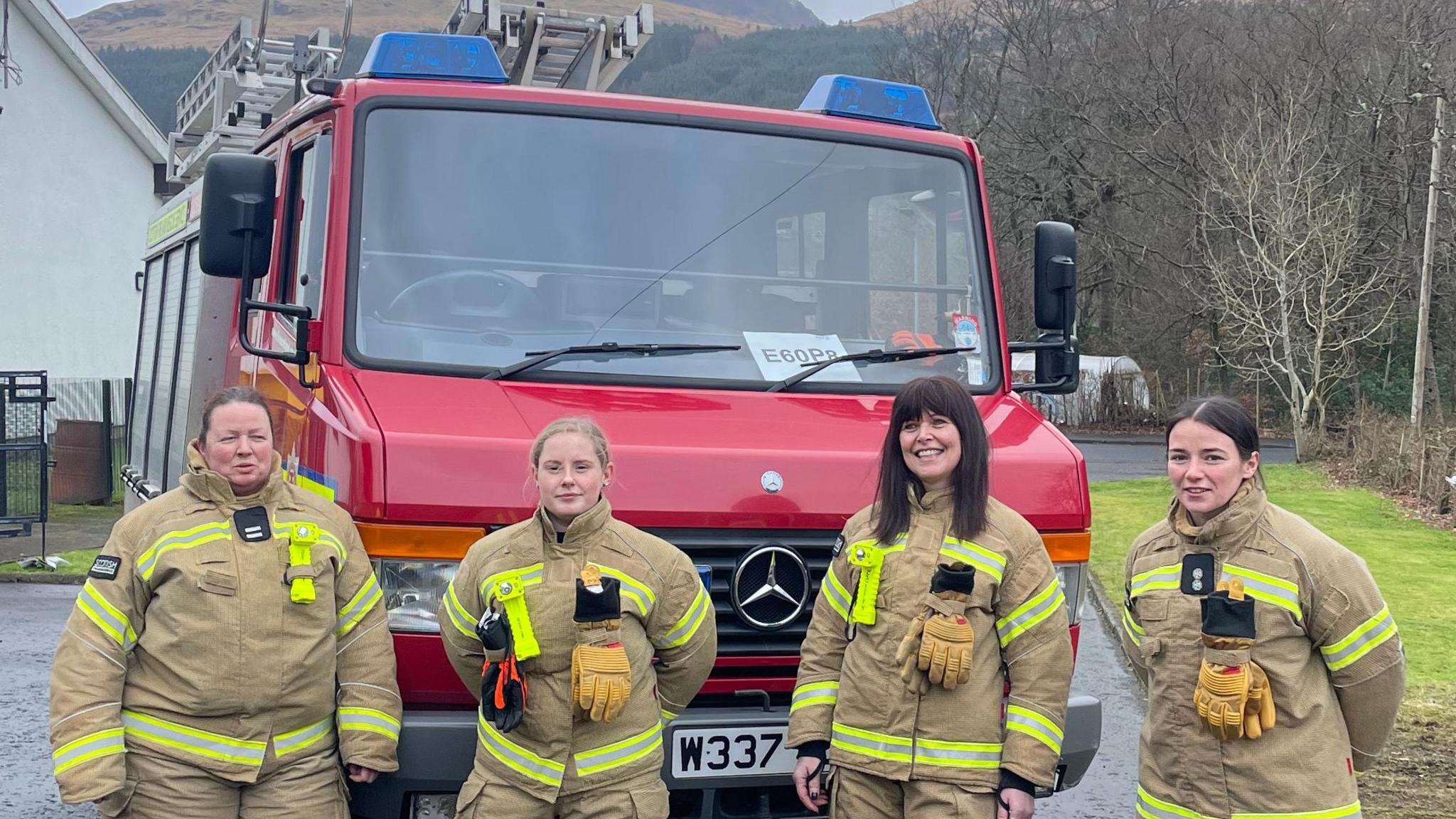
Emma Hayes, Kirsty Wright, Sarah Keating, and Kelly McSporran are volunteer firefighters
- Published
They could be doing the school run or in the middle of lambing, but when their pager goes off, volunteer and retained firefighters across Scotland drop everything.
In an average time of five to eight minutes, they can respond to building fires, road accidents, wildfires and medical emergencies.
In many remote and rural communities teams of these highly-trained volunteers could be the difference between life and death.
Four volunteer firefighters from Argyll have spoken to BBC Scotland News about juggling the role with their day-to-day lives.
I want to protect my community
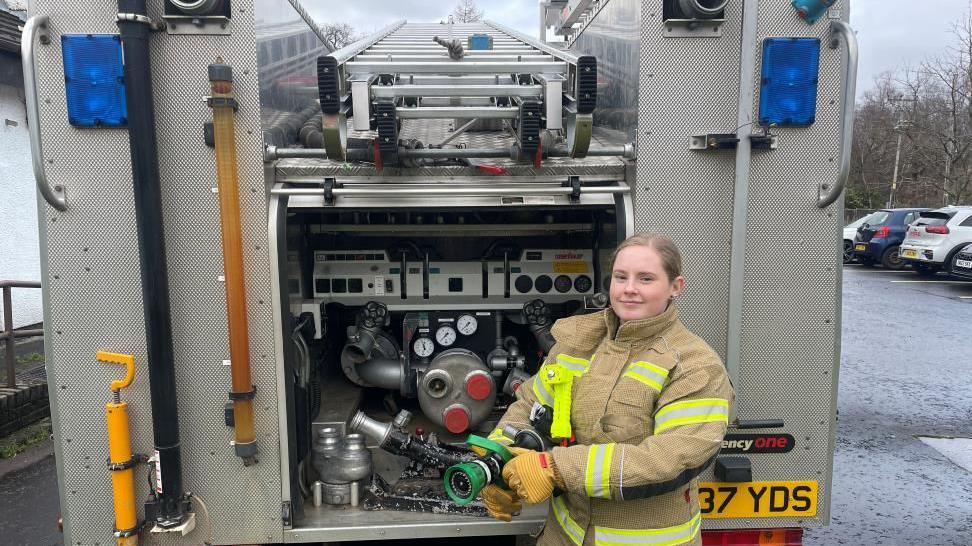
Kirsty Wright is a firefighter, a farmer and a housekeeper
Kirsty Wright is the deputy crew commander at a fire station on the Inner Hebridean island of Lismore.
The 25-year-old also has her own flock of sheep, and a job as a housekeeper on the mainland.
“We had an incident last year when I was in the middle of making a bed when my pager went off and my boss was like ‘oh she’s got to go, she’s got to run’," Kirsty said.
“I also have sheep so I could be farming, I could be out in the fields looking over my flock or if it’s during the busy period on the farm I could be in the middle of lambing or shearing.
“I’ve kind of moulded my other jobs to fit around my fire service role just because I enjoy it so much.”
Kirsty is one of 266 volunteer firefighters in Scotland.
She joined the fire service when she was 18 and about to start college. She wanted a job that would fit around her studies.
Living on an island without any first responders means Kirsty and her team are often called out to medical emergencies and to help other agencies.
She said she felt the role allowed her to “protect” her community and the 180 people living there.
What's the difference between a retained and volunteer firefighter?
Retained firefighters carry a pager and respond to a range of emergency incidents, during their agreed “on call” hours.
They commit to being on call either 120 or 90 hours a week, during which time they must stay within minutes of their base station.
Once they are fully trained, they are paid an annual retainer fee of up to £3,224. They also receive an hourly rate for each incident they attend and for training nights and community engagement trips.
A disturbance fee is also paid for responding to emergency callouts.
Volunteer firefighters operate on a “call out” basis and are based in the most remote villages and islands within Scotland. They respond as and when they can and are only paid for the call outs they attend.
Volunteers receive an hourly rate of between £11.05 and £14.72 when responding to a page plus a disturbance payment of £4.24.
Neither the retained nor volunteer firefighter positions are full-time roles, meaning many juggle the responsibility around their everyday jobs and family lives.
Firefighting has rebuilt my confidence
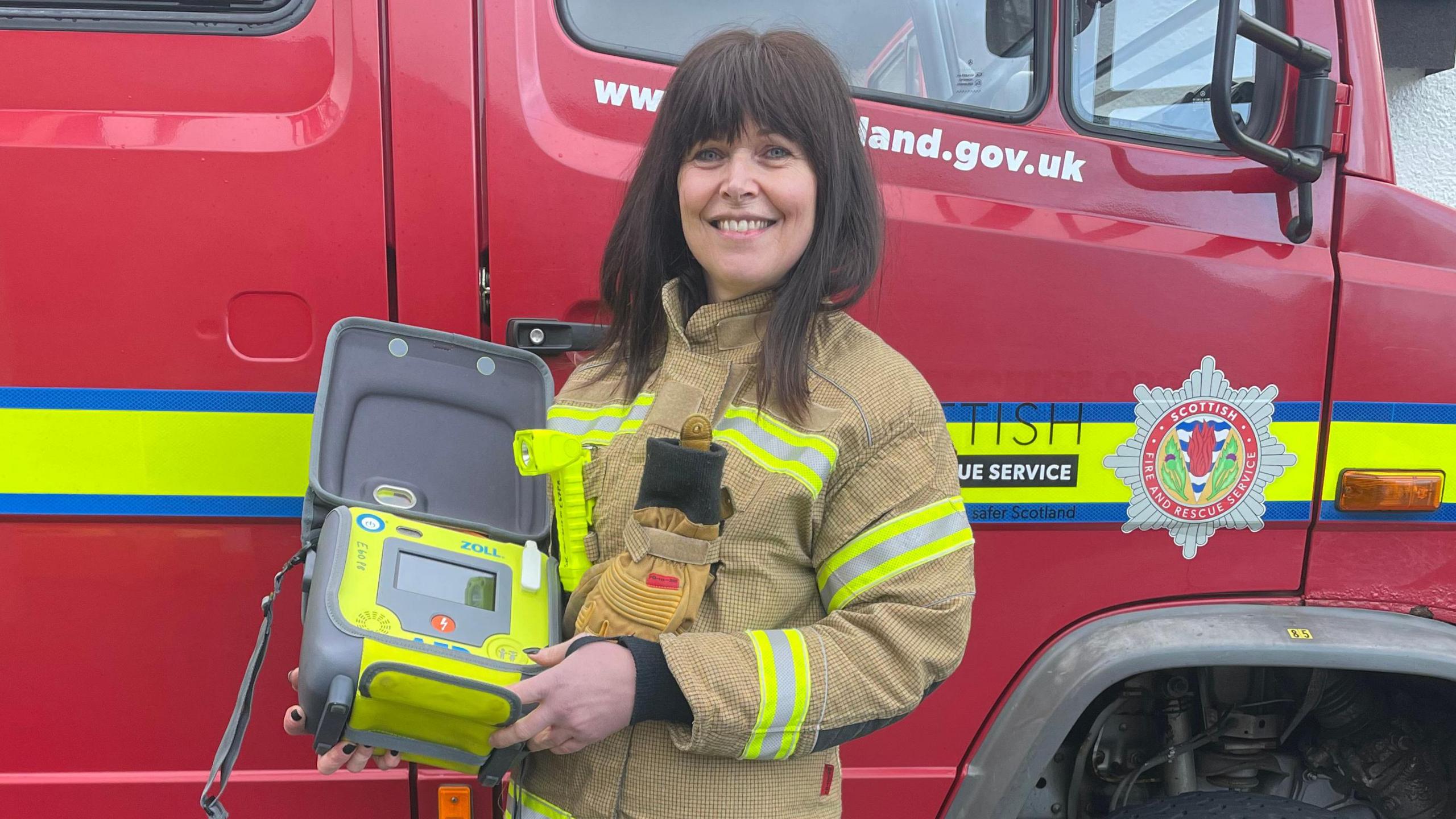
Sarah Keating from Appin said her role in the fire service has restored her self-confidence
Sarah Keating is a volunteer firefighter and the deputy leader at Appin community fire station.
Alongside her team, she attended 63 callouts last year.
She joined the fire service after the breakdown of her marriage and a period of poor mental health. She credits the role with rebuilding her self-confidence.
“It’s renewed my faith in myself. It’s made me see that I wasn’t a failure,” she said.
A single parent of three children, she also juggles her volunteer role with a job as a cleaner.
“My first call out was an explosion and a massive fire in the garage next door to our home so it was a very traumatic experience for the kids to be in the house and watch me attending it,” the 52-year-old said.
Sarah’s youngest son was just four or five at the time and was left particularly upset after the fire.
She said: “He developed the worst anxiety ever and would basically wrap his legs round my feet when the pager went off and beg me not to go, in tears, hysterical tears.
“I’d have to attend the callouts feeling heartbroken to see him like that.”
She took him for a trip to the fire station and explained that she was helping people, and that she was not in any danger.
The next time her pager went off her son was "handing her the keys".
She said her role in the fire service had not only benefitted her but had also given her children “resilience and confidence”.
We're the difference between life and death
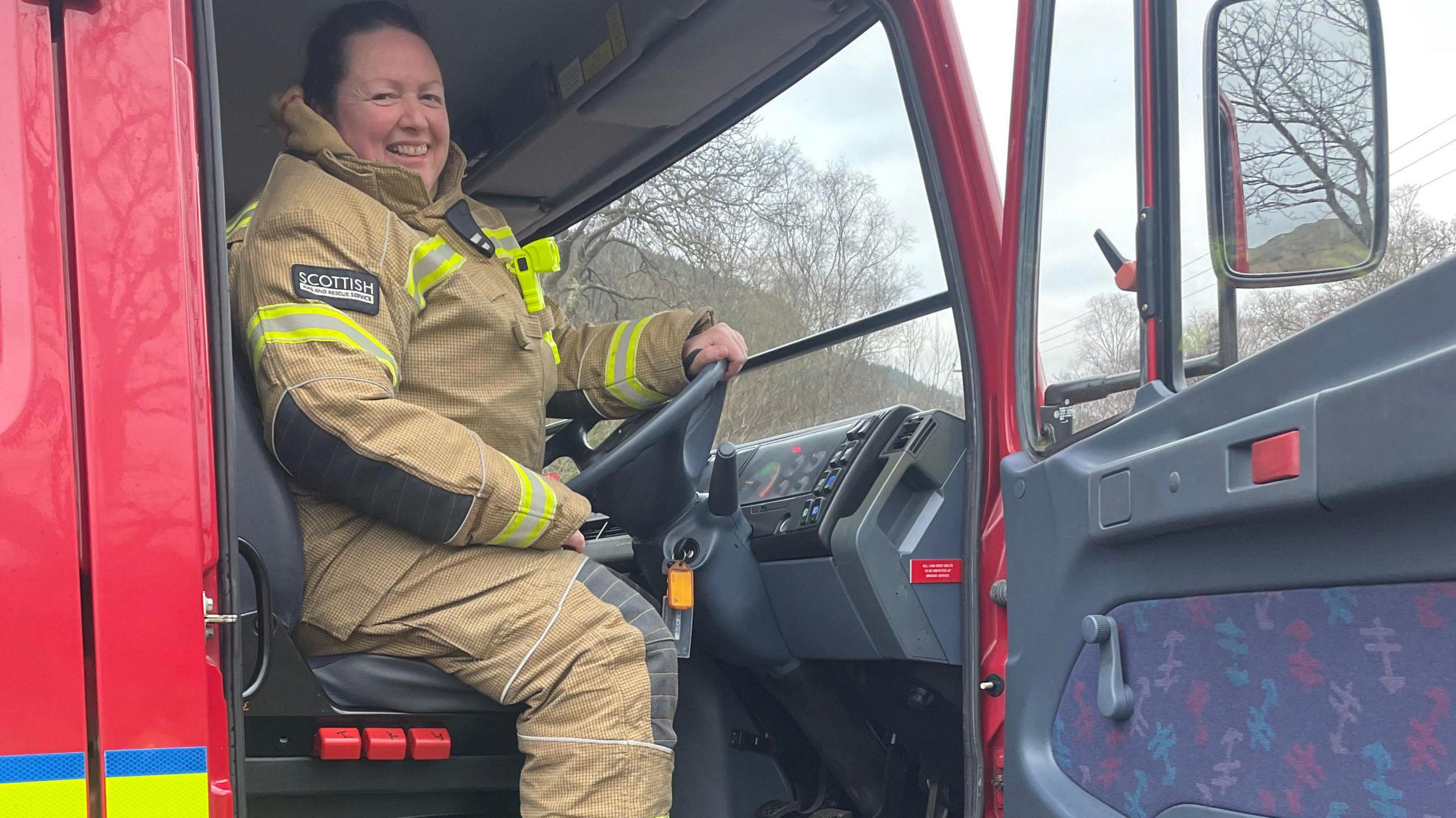
Emma Hayes says the role can save lives
Crew commander Emma Hayes of Lochgoilhead fire station is also a full-time student, working towards becoming a nurse.
The 50-year-old said the service her team provides could mean the difference between life and death.
They were recently paged to a fire in Carrick Castle, a village about six miles from Lochgoilhead.
"We were there in 14 minutes to that householder with ready-to-go breathing apparatus, we could’ve done a snatch rescue and that person would’ve lived," she said.
Luckily, the home owner was out at the time.
But if Emma's crew had not arrived, it would taken almost an hour for crews from further afield to get to the remote village.
"In 50 minutes that house was fully ablaze so that home owner wouldn’t have survived so it would make a difference between someone surviving and not," she said.
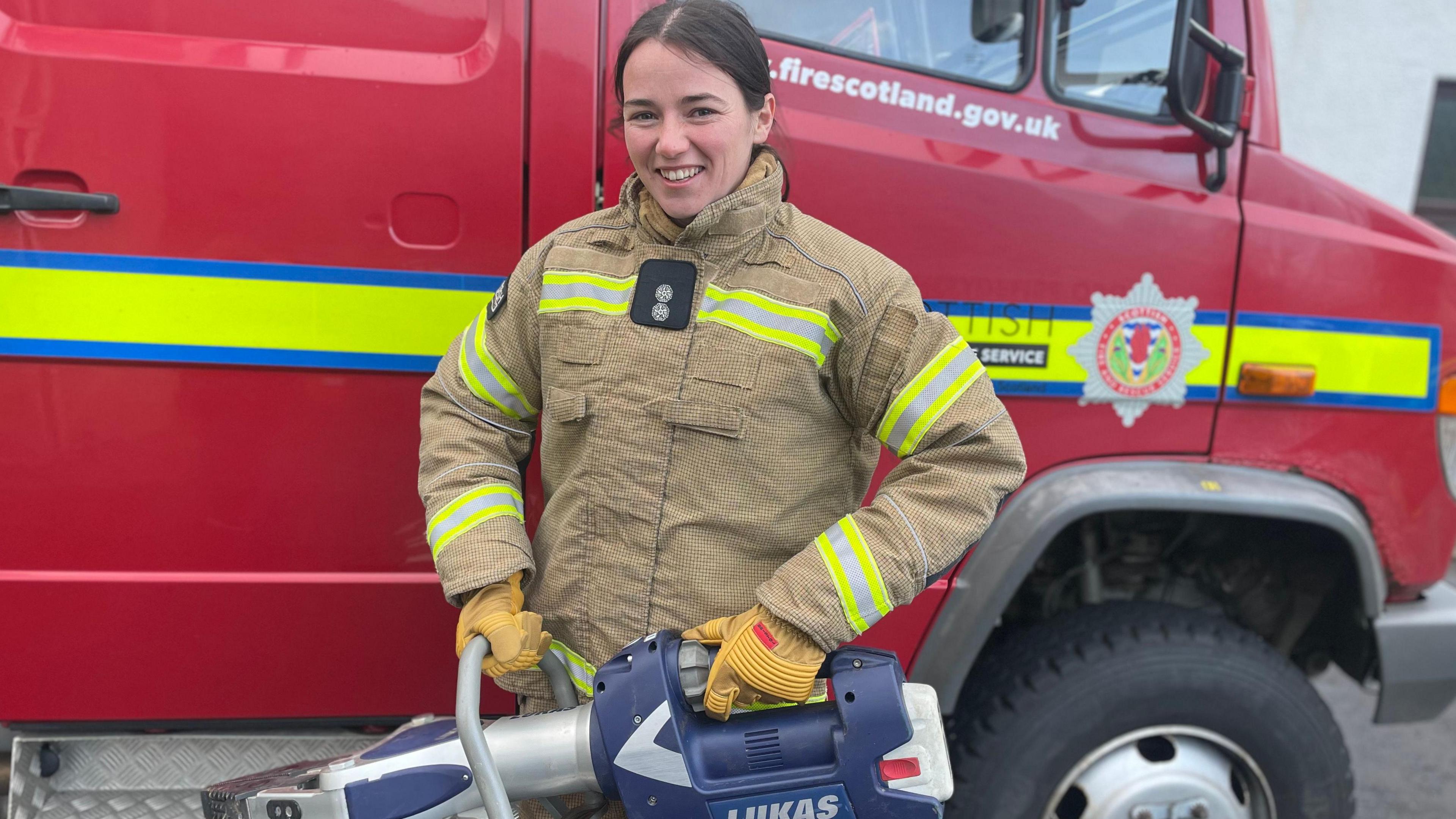
Kelly McSporran has spent more than half her life with the fire service
Kelly McSporran first became involved with the fire service when she was just 13, rising through the youth volunteer ranks before joining the on-call roster when she turned 20.
She is now a full-time employee of the Scottish Fire and Rescue Service, heading up the youth system of which she was once a member.
But she remains a retained firefighter - one of 2,735 in Scotland.
The 31-year-old is called upon to make up crew numbers at seven fire stations in Argyll and she commits her evenings and weekends to being on call.
"On my crew we have an HGV driver, paramedics, office workers and even some whisky distillery employees," said Kirsty, who is based in Campbeltown.
In order to attend a call out, each station must have a minimum of five crew members available, meaning the Scottish Fire and Rescue Service is always on the look out for more volunteers to join its rosters, external.
She said the service was looking for a diverse range of people to join.
Get in touch
What stories you would like BBC News to cover from Glasgow and the west of Scotland?